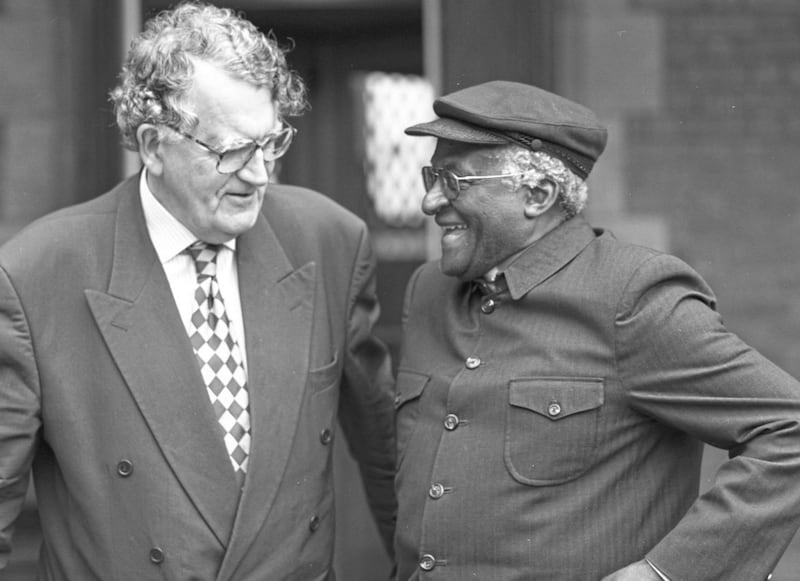Last week I interviewed a South African woman who says she forgave and hugged her father’s murderer. She even campaigned for him to be released from prison.
Candice Mama was just nine months old when her 24-year-old father was brutally murdered by a notorious apartheid regime police colonel.
Her family was fractured, her mother thrust into widowhood. Life was extremely hard and Candice struggled with depression and anxiety in her teenage years.
She says the day she met her father’s killer – and told him she forgave him – was the day she was set free from the prison that had held her until that point.
As she spoke, I thought of the very many families I had met over the years as a reporter here. Mothers who buried their sons, wives whose husbands were gunned down in front of them on their doorsteps, innocent people who never came home because of hatred and violence.
- Dark day for all victims as Legacy Act takes effect - The Irish News viewOpens in new window
- Brian Feeney: By hook or crook, Britain will never reveal its role in the ‘dirty war’Opens in new window
- Leona O'Neill: British government's Troubles amnesty plan won't end fight for truth and justiceOpens in new window
In speaking to those families, I noticed the one thread that weaved through their pain was that in most cases, they never got answers, justice, nor closure and in turn peace.
Their lives were often consumed – from the moment their loved one’s heart stopped beating till their own gave out – with seeking the truth, having someone held accountable, to know that their loved one meant something, that they were important in this world, that their death was worth investigating.
Candice met her father’s killer in prison. He was able to detail exactly what happened to her Dad, down to the minute, grim and graphic detail of his murder. The family listened, they cried and they in turn told his killer that they forgave him.

There was remorse. A monster was slain, a human being stood in front of a family and cried over his actions. There was healing, moving on, a personal freedom in letting go of hatred and fear.
There was no forgetting, but there was forgiveness. Not for the sake of the killer, but for the sake of themselves. Forgiving meant a freedom from their pain.
The Legacy Act came into force last week, an act that essentially shuts down Troubles-era inquests and paths the way for the Independent Commission for Reconciliation and Information Recovery. We don’t know yet how this will play out but many feel justice will elude many now.

What is certain is that without justice, families here will continue to carry their torment and pain, and hand that pain, resentment and heartache down through generations to come. That does not a healthy society make.
Northern Ireland leaned into the South African peace process and drew much inspiration from their journey. Their motto was ‘Truth the Road to Reconciliation’.
Candice was able to look her father’s killer in the eye, ask him questions, find healing in the truth and move on past her hurt. That has not yet been afforded to so many here in the north. The truth on all sides has been resisted at every turn.

Families have had to fight for decades to even get simple inquests, veterans have marched on the streets calling for soldiers to be ‘left alone’ by those praising their actions. Those who died at the hands of paramilitaries may never know the truth as protecting killers has so far taken precedence over the pain of families, while paramilitary killers are commemorated as heroes. Our motto thus far seems to have been ‘Secrecy the Road the Perpetual Pain’.
Who knows what will happen now. Will perpetrators give the truth willingly or take their secrets to the grave? Faceless killers in balaclavas or uniforms took lives here – a fact that haunts and torments loved ones as they wonder if they are passing them on the street. Will they now lay bare their wrongdoings?
Without truth and justice there can never be closure. Without closure there can never be forgiveness. Without forgiveness there will never be true reconciliation and we will be stuck in this perpetually circling motion of resentment, fear and pain
Forgiveness will never come easy without truth and justice. There are exceptions of course, but most people feel unable – understandably so – to forgive without remorse, accountability and evidence that their loved one mattered in this world. I spoke to one woman who lost her brother in the Troubles – who spent her entire life seeking justice – who said when she died, her son had promised to take up the fight, and his child after that.
Without truth and justice there can never be closure – our collective human wound will remain open to festering. Without closure there can never be forgiveness, without forgiveness there will never be true reconciliation and we will be stuck in this perpetually circling motion of resentment, fear and pain.
Our monsters will remain so.




